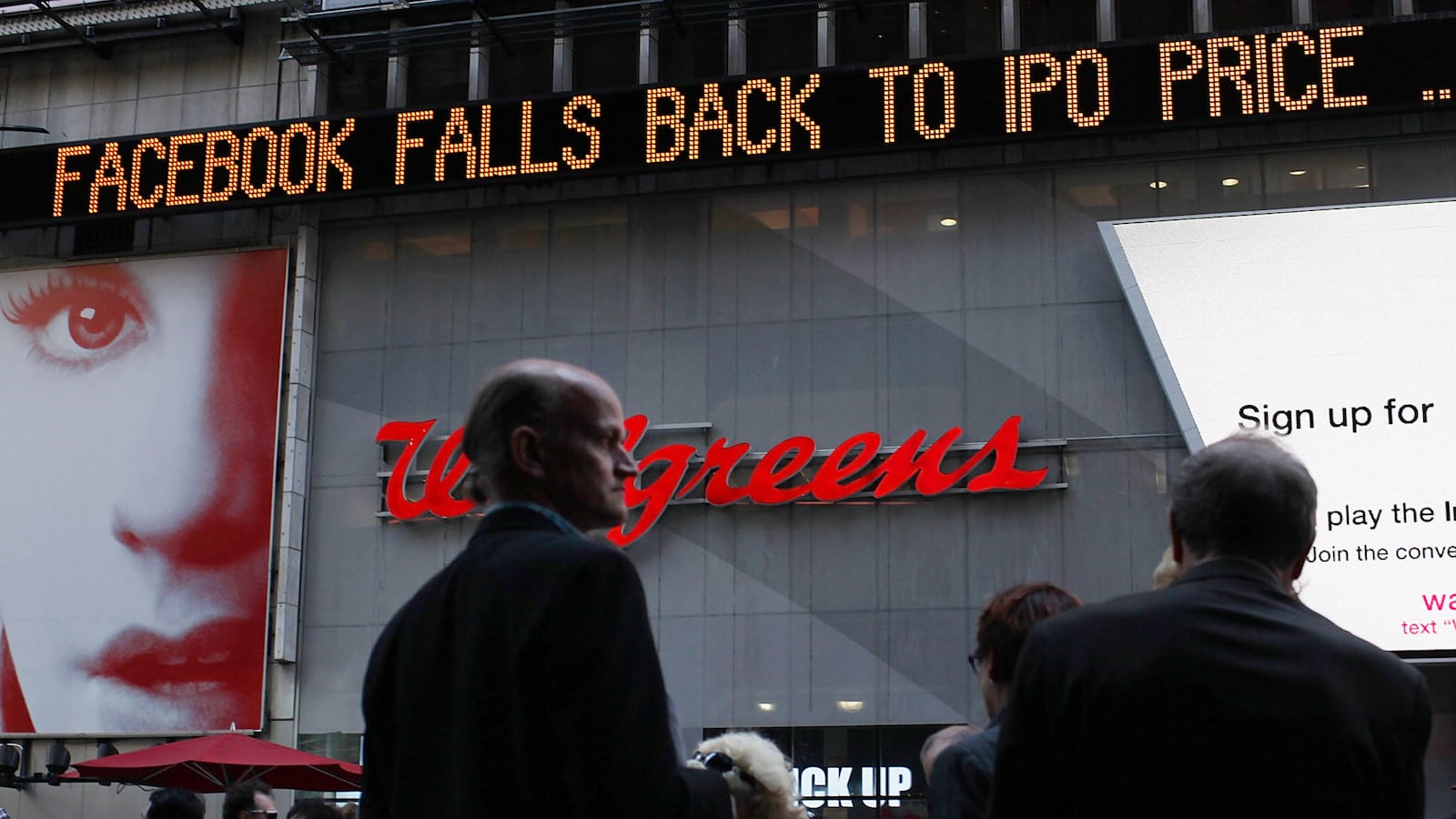Facebook’s epically hyped IPO debuted not with a bang but with a whimper. While the company sold $16 billion worth of initial shares, the stock ended the day largely where it began, at $38 a share, leaving the company with a market cap of about $100 billion. The offering was widely derided by the Wall Street community of traders, who viewed the stock's failure to soar on day one as a sign of troubled times ahead for Facebook.
But how a company that didn’t exist 10 years ago and now commands a market value of $100 billion could be considered a failure says more about the odd lens of Wall Street than it does about Facebook itself. Yes, the social-network giant may in time prove unable to justify its lofty price, and it will need to grow at a very rapid clip (probably in excess of 50 percent a year for the next several years) to satisfy both its own goals and the expectations of investors. But dismissing the company as hype and the offering as a bust is yet another sign that it is the financial world that's in need of fixing, not Facebook.
In fact, given what has happened this past week in financial markets—with stocks plunging as much as 10 percent around the world in reaction to disarray in the euro zone triggered by Greek elections and Spanish banking fears—the fact that Facebook maintained its valuation should be seen as a small victory. And the fact that it went public at all in this climate is mildly remarkable. During a period where most investors are fleeing stocks and anything risky, both professionals and retail investors snapped up Facebook shares.
In essence, we are faced with two possible futures: either the world will be imperiled by the structural issues evidenced by euro-zone troubles and the continued panic-ridden psychology of financial markets, or the global middle class will continue to expand and the American middle class will reinvent itself thanks to new innovations in technology in general and social media in particular.
Whenever a group of Silicon Valley or tech entrepreneurs encounters a group of Wall Streeters, it isn’t long before they react as follows: “What is your problem? Why are you consumed with visions of impending doom, scouring the planet for hidden Black Swans? What happened to a creating a better world, unleashing human potential, having fun? What happened to dreaming of solutions rather than fixating on problems?” And that is why companies like Facebook are looking forward, while the financial world devolves into the crisis du jour, whether that be the fate of Greece, the pace of China’s growth, the level of risk at JPMorgan Chase, or the perils of future inflation, deflation, fiat currencies, soaring commodity prices, and debt bombs.

Silicon Valley has its own weaknesses: the cabal of successful investors is small and insular. They co-invest in each other’s companies, avoid public markets and stocks except when their own companies go public, and have a tendency to move in packs and latch onto fads. Facebook and other companies such as Zynga, LinkedIn, Pandora, and Groupon have made a few founders exceedingly rich but have reinforced the massive wealth disparities as surely as any reviled Wall Street institution. The only difference is that the 99 percent don’t seem to begrudge them their billions.
More to the point, for all the hype, it’s still unclear what social media actually adds to our economic prosperity. Facebook satisfies a social need to connect, but it has not demonstrated—yet—how it can help people be more productive and break free of the declining spiral of lower wages and stagnant economy. It may in time prove to be central to changing the way information is processed, and it may, along with others, become pivotal to the reinvention of work and play in much the same way the information technologies of the 1990s have so demonstrably reshaped our lives. But it hasn’t yet.
Finally, some dismiss Facebook and others for simply pushing a product and constraining rather than liberating consumer choice. But a company can self-servingly push a product (or a service) and still unleash collective potential and be a force for positive change. The telephone, the cell phone, the computer, the automobile, the jet engine, the Internet, refrigerators—all of these are products that some company or companies created and sold.
And in a week when the world is being pulled back into another chapter of this multiyear financial crisis, the emergence of Facebook as a public company offers some light that the future holds possibility that the problems of the past cannot and will not quash. In a week when the ancient cradle of Western Civilization, Greece, seems to imperil the prosperity of the modern West, Facebook’s golly-gee optimism tinged with greed, a dash of naiveté, and a bountiful dose of hubris and hope that the world can be made anew and better, is something to celebrate and support.
At worst Facebook and its brethren are overhyped and will underdeliver; on the other hand, the morass of the dark psychology of the financial world will become a self-fulfilling prophecy. Which would you prefer? If the tech visionaries of today are even partly vindicated, we not only will avoid the disasters that so many in the financial world foresee, but we will create a future far brighter than many now believe possible. That optimism is an irreplaceable ingredient for our collective well-being; it is in ever-shorter supply, but in tech land at least, it is alive and well.





